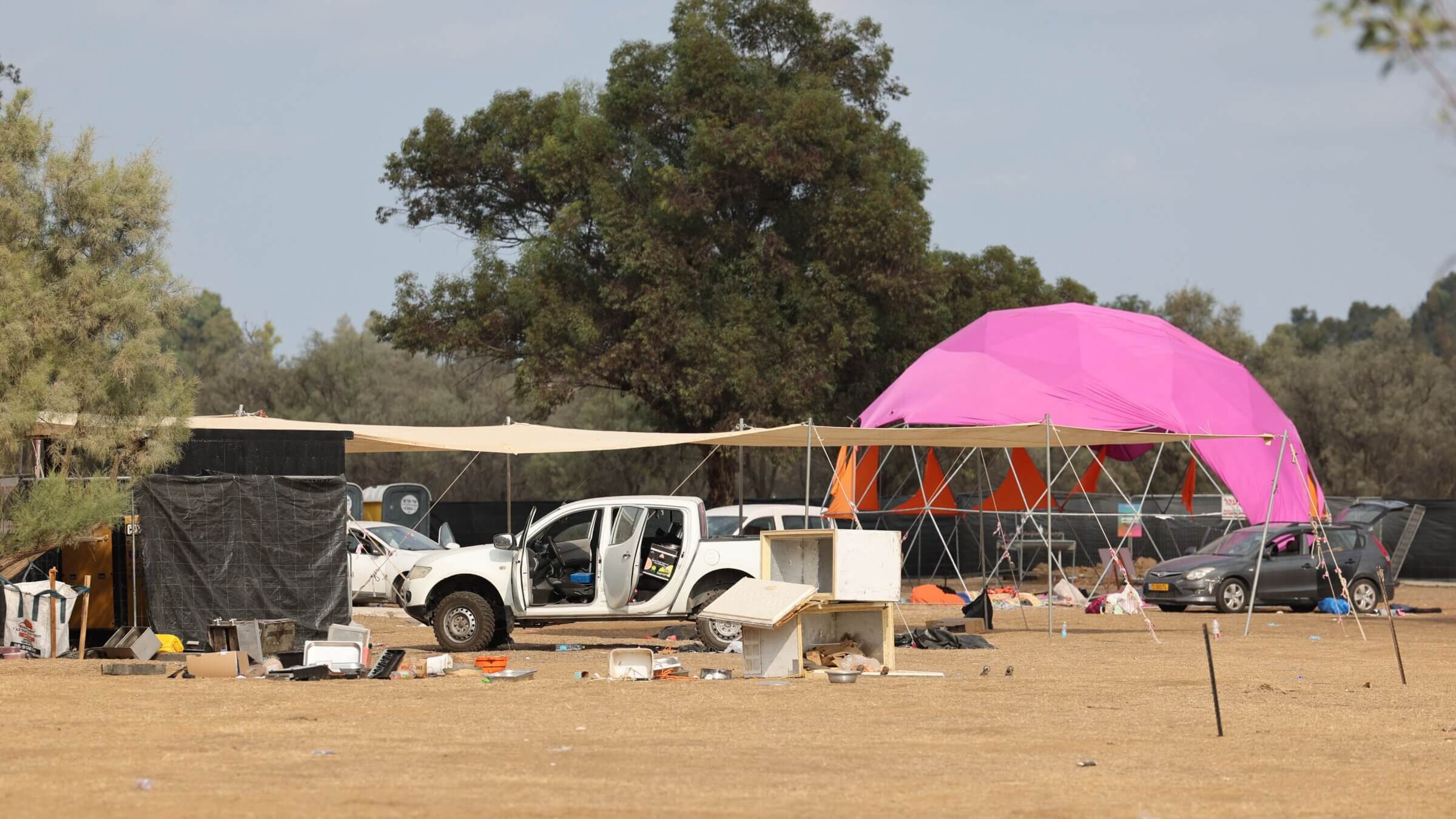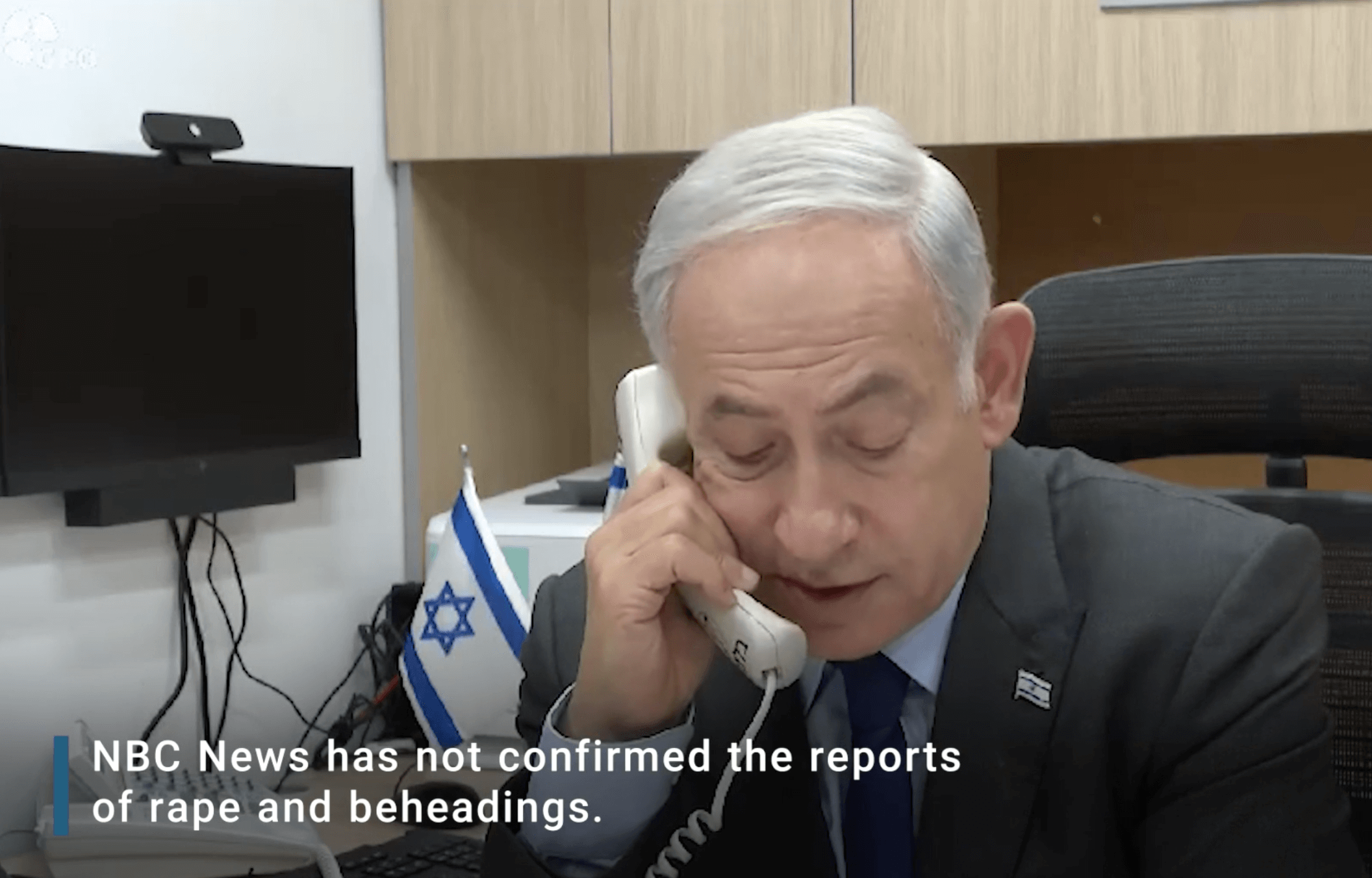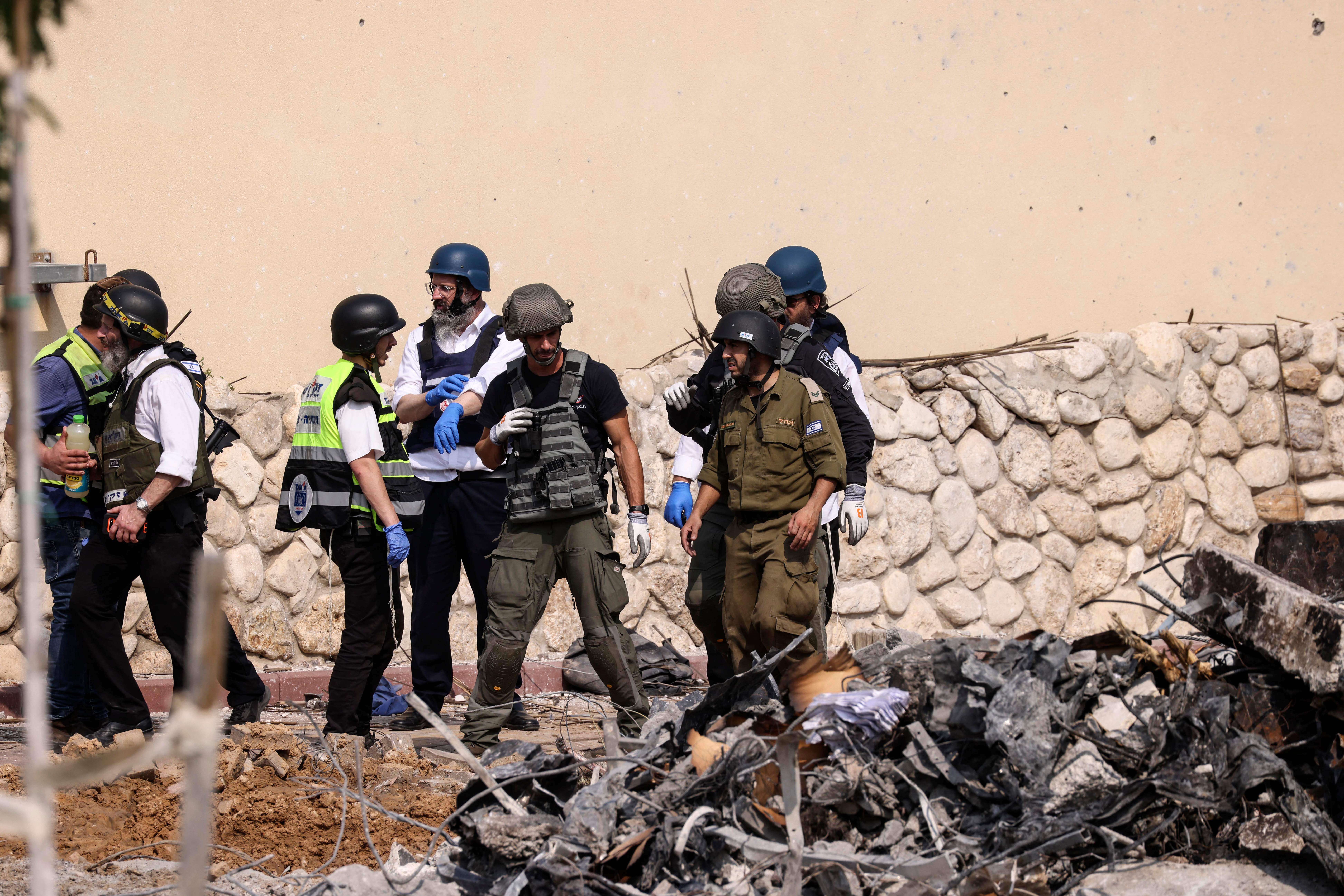How Biden condemned Hamas for rape before the IDF had evidence it happened
A close look at how social media and politics operate in the fog of war

The abandoned site of the Supernova desert music festival, where Hamas militants massacred Israeli civilians Saturday. The festival was the site of several accounts of rape during the attack. While those accounts have been widely repeated, Israeli officials have so far said they do not have evidence of such incidents. Photo by Getty Images
Editor’s note: The chief spokesperson of the Israel Defense Forces stated that rape and other atrocities were committed during the Oct. 7 terror attack in a televised statement Oct. 21, and other Israeli officials and civilian responders also described evidence of rape since this article was published.
In a historic, impassioned speech expressing unbridled U.S. support for Israel on Tuesday, President Joe Biden listed among the atrocities Hamas had committed that women “were raped, assaulted, paraded as trophies.”
A White House spokesperson told the Forward that this assertion was based on a phone call earlier that day in which Prime Minister Benjamin Netanyahu had told Biden that Israeli women had been “brutally raped and murdered.” Similar characterizations have been included in condemnations of Hamas by columnists, celebrities and editorial boards.
But the source of the rape allegation remains murky. While sexual assault is a common feature of violent conflict worldwide, the Israel Defense Forces told the Forward Tuesday night that it does not yet have any evidence of rape having occurred during Saturday’s attack or its aftermath. And most mainstream media outlets have avoided mention of rape, with the Los Angeles Times and NBC News specifically stating they have been unable to verify the claims.

How references to rape became a ubiquitous element in denunciations of the unprecedented Hamas attack exposes the challenges of understanding a war that is unfolding in real time across social media, an ecosystem that is rife with disinformation and vulnerable to abuse by propagandists.
“It’s important to distinguish between claims that are false and claims that are not verified yet,” noted David Broniatowski, an expert on social media at George Washington University. “If what you conclude is, ‘Well I’m not sure, this is unverified,’ think about the social consequences of sharing.”
Disinformation experts have criticized X, the website formerly known as Twitter, for failing to moderate content about the conflict, including allowing graphic videos of the Hamas attack to circulate over the weekend.
A White House official said Wednesday morning that Biden had based his comments off both his phone call with Netanyahu and an article in The Times of Israel that referenced videos circulating on social media that “have raised concerns of sexual assault against women.” The official, speaking on the condition of anonymity, noted that the president had described the rape allegations as “stomach-turning reports,” not verified facts.
Others have not been as careful.
“These are people, as you’ve been reporting and others have seen, that deliberately targeted teenage girls, women and children, the elderly, not just for rape and murder but then dumping their bodies off on the streets of Gaza,” Sen. Marco Rubio, a Florida Republican, said Monday on CNN. “Just horrifying things.”
In an editorial, The Denver Post on Tuesday condemned a local politician for failing to speak out against “the murder, rape and torture of innocent civilians.”
Abe Foxman, the former longtime head of the Anti-Defamation League, complained in a letter to Troy McKenzie, dean of New York University’s law school, that McKenzie had failed to denounce “rape,” among a litany of other offenses, in his statement about the Hamas attack.
Meanwhile, the Los Angeles Times removed references to rape from a column published Monday, adding a note that said “such reports have not been substantiated.” And when NBC News posted a video of Netanyahu stating that women had been raped, it superimposed a disclaimer stating that it had not confirmed his assertion.
The author of the Times column, Jonah Goldberg, did not respond to a request for comment Wednesday. A spokesperson for the newspaper, Hillary Manning, said, “We don’t wish to comment beyond what is stated in the correction.”
Asked about the rape allegations following Netanyahu’s remarks, an IDF spokesperson said, “We can’t officially confirm any of that yet.”
Origin story?
The reports of sexual assault appear to have several roots amid the scattered media accounts of the violent chaos in southern Israel after Hamas militants breached the border fence in a surprise attack that killed more than 1,200 Israelis.
Liel Leibovitz, a right-wing columnist for the online Jewish magazine Tablet, published an article Sunday based on interviews with unnamed survivors of the Hamas massacre at the desert music festival near the Gaza border. Emergency responders estimated that more than 200 young people were killed there and an untold number kidnapped.
“Women have been raped at the area of the rave next to their friends’ bodies, dead bodies,” Leibovitz quoted one attendee saying. The person did not say they had witnessed these incidents, and at one point was recounting videos they had seen on social media.
“Several of these rape victims appear to have been later executed,” Leibovitz wrote, without citing a specific source. “Others were taken to Gaza. In photographs released online, you can see several paraded through the city’s streets, blood gushing from between their legs.”
The Tablet article did not, however, include specific photos. Two videos circulating online over the weekend were also being used as evidence of sexual assault, although neither precisely matched Leibovitz’s description.
(Editor’s note: We are not embedding the videos in this article because they are unverified, graphic, and may contain images of sexual assault victims.)

The first shows an Israeli woman being removed from the back of a Jeep with her hands bound behind her back. She has blood on her arm, dirt stains on her legs and a large, dark stain across the seat of her pants.
A high-ranking Israeli military official, speaking on the condition of anonymity, said that video was the only evidence of rape or sexual assault of which he was aware.
Honest Reporting, a pro-Israel advocacy group, said in a post Wednesday that a Netanyahu spokesperson had offered an account similar to the one in Tablet, stating that “women were raped next to the bodies of fellow festivalgoers” in the desert.
The Israeli Government Press Office did not respond to questions about whether it had evidence of sexual assault or rape during the attack.
The second video shows a woman who has been identified by her family as Shani Louk, 22, lying face down in the back of a pickup truck in her underwear as men spit on her.
The Times of Israel article apparently referenced by Biden described both videos.
Yuval Shany, an expert on international law at Hebrew University, told the newspaper that it was “too soon to know” if there was “a pattern of sexual assault, noting that combat operations are ongoing and testimonies are yet to be taken.”
At least two other articles include secondhand accounts of rape during and after Saturday’s attack.
Shani Hadar, a 35-year-old survivor of the attack on the desert party, told the Israeli outlet Ynet News: “I know they kidnapped girls. That they raped women even after killing them.”
Appearing to describe footage she saw of the attacks, Hadar added: “They called the parents of a woman who was kidnapped, and said, ‘Your daughter is alive, we’re going to rape her.’”
On Tuesday night, PBS News Hour published an account from Raz Cohen, who survived the festival massacre: “The terrorists, people from Gaza, raped girls. And after they raped them, they killed them, murdered them with knives, or the opposite, killed — and after they raped, they — they did that.”
The Hindustan Times, an Indian newspaper, quoted an Israeli woman Wednesday who only provided her first name, Moran, identified as a 40-year-old mother from Ramat Gan, a city in central Israel. “A girl, a friend of my friend, was raped in the streets of Gaza as everyone cheered,” Moran said. “Using her personal phone, the men sent a video of the crime to her family.”
On Wednesday afternoon, the Jewish Telegraphic Agency published the account of a festival survivor named Gad Liebersohn who said he heard women being assaulted from his hiding place near the concert grounds.
“For two hours I’m hiding and hearing people getting kidnapped and women getting raped, and without end you hear people dying, begging for their life, women begging for their life,” he said.
Unverified videos
There are also three videos circulating on social media that purport to show Hamas fighters discussing rape that appear to have racked up well over 1 million views combined. Their origin is unclear.
The first one, posted over the weekend, consists of an audio conversation between two men, with captions in Hebrew and English that identify them as “first Palestinian terrorist” and “second Palestinian terrorist.” The audio is accompanied by an image of the woman in the video described above being taken out of the Jeep.
According to the video’s captions, one man tells the other: “The girls we have brought are sexy and blonde. We’ve murdered the ugly ones.”
The second man responds: “They will love me. They’ll fight with each other to be with me.”
In a second video, someone walks by a group of young girls sitting on the floor of an unknown location using their phones and speaking with each other. The audio is of a man saying “sabaya,” an Arabic word that typically is translated as “group of young women” but can also mean “female captive.” The Islamic State uses the term to refer to sex slaves.
The third video, which began spreading online Wednesday, is captioned “interrogation of a Hamas terrorist. Untouched. Unedited.”

In it, a man is shown from the back sitting at a table. The interrogator is not on screen, and his voice is scrambled on the video. The suspect says that Hamas kidnapped women “to have their way with them” and “to rape them.”
“And why take the kids and the babies?” the interrogator asks.
“To rape them,” he says again.
A spokesperson for the IDF could not immediately confirm the authenticity of the video Wednesday.
It is not clear who first posted this video online. Hen Mazzig, a pro-Israel pundit with a large social media following, whose post of the video on Instagram has received more than 700,000 views, did not respond to questions about where he found the footage.
Broniatowski, the George Washington professor, said that it sometimes can make sense to share unverified claims. In the case of a hurricane or wildfire, for example, it might be better to err on the side of encouraging people to evacuate.
“On the other hand, if the consequence is that people end up really misinformed in a way that possibly stokes further violence — then there could be a negative consequence to share it,” he said. “Context really matters.”
















